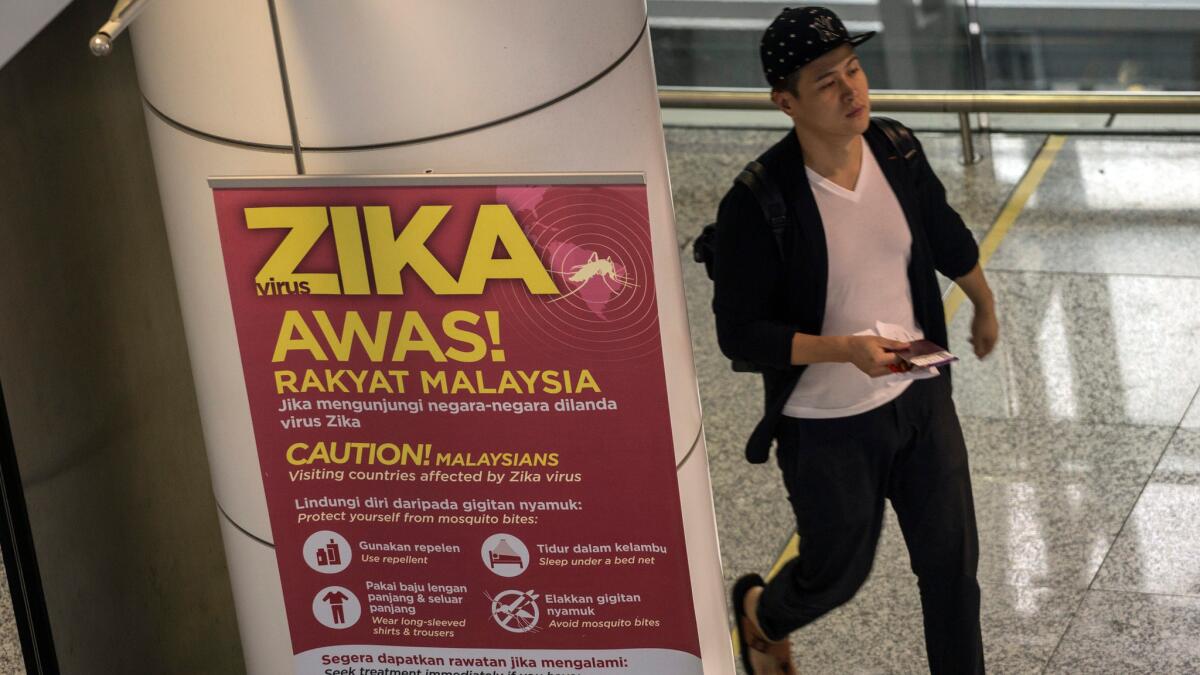If you’re worried about illnesses, travel insurance may not be your best investment

- Share via
The Centers for Disease Control and Prevention’s strongly worded alerts about the dangers of the Zika virus mean that having travel insurance should allow you to cancel a trip to an affected destination, right?
Or in the case of norovirus, which causes digestive woes, should let you cancel your cruise, correct?
Or an outbreak of yellow fever in southwest Africa should mean it’s OK to cancel that trip, yes?
Wrong. Wrong. And wrong. At least if you’re hoping to be recoup your money.
Travelers have long had to worry about contracting diseases that at best cause inconvenient symptoms, or at worst require evacuation mid-vacation to a hospital.
But fear, worry’s companion, usually isn’t a covered reason in the insurance world, at least not in most standard insurance policies. Unless, that is, you have cancel- for-any-reason coverage, an upgrade that can increase the price of a policy by about 40%, according to Squaremouth.com, an online travel insurance comparison site.
Cancel-for-any-reason coverage this month for a $4,000 trip for two to Brazil ranged from $116 to $386, which included medical and evacuation expenses from zero to $1 million, according to Squaremouth.
Policies usually require that travelers insure every bit of their prepaid, non-refundable trip costs, such as flights, tours, deposits or penalties, to receive back up to 75% of those costs.
“For the most part, travel insurance policies do not appear to cover cancellation due to a government warning about travel to a particular area,” said Megan Freedman, executive director of the U.S. Travel Insurance Assn.
“However … some plans may cover pregnancy that occurs after the policy is purchased, and of course, ‘cancel-for-any-reason’ plans … allow the customer to cancel if they choose to do so.”
Though such policies sound like no-strings-attached deals, many are time-sensitive and may require purchase within 14 to 30 days of your first booking or deposit date. The policies also may require cancellation at least two or three days before your planned departure date, said Rachael Taft, a spokeswoman for Squaremouth.
Zika is of special concern because, according to the CDC, there is no vaccine to prevent or medicine to treat the virus. Not only can the Zika virus spread from mother to unborn child and through mosquito bites, it also can be sexually transmitted even by people who aren’t showing symptoms. When uninfected mosquitoes bite an already infected person, they become carriers that can spread the virus.
Zika infection during pregnancy is linked to an increase in babies born with abnormally small heads, a condition known as microcephaly, often because the brain did not grow properly.
The CDC urges travelers to “practice enhanced precautions” such as preventing mosquito bites by wearing long sleeves and pants, taking refuge under mosquito nets and using EPA-registered insect repellent. The agency hasn’t yet issued warnings to avoid all nonessential travel to affected regions.
The CDC has issued travel notices across vast areas stretching from South Florida to South America to Singapore; 3,625 locally acquired or travel-associated cases have been reported in the continental U.S. so far this year. Outbreaks in Puerto Rico have spread the virus to more than 21,000 people, according to the CDC.
The specter of massive Zika infections in Brazil hung over the 2016 Summer Olympics in August and the Paralympic Games in September. In early June, the CDC advised women who were pregnant or trying to become pregnant to avoid the Summer Olympics or take extreme caution.
Although most people who are infected with Zika don’t get sick (or their symptoms are so mild they don’t know they are sick), investigators are studying a possible link to Guillain-Barré syndrome, a disorder that can lead to paralysis.
It’s not just Zika that can cause a problem. In the last few years, there have been health scares concerning chikungunya (a rarely fatal but very painful disease that was found in many Caribbean countries), avian flu, Ebola, dengue fever and Middle East respiratory syndrome, or MERS.
Are you covered? Your best precaution is to read the fine print of your travel insurance policy or call and chat with an agent so you understand your coverage and reimbursement options.
Sign up for The Wild
We’ll help you find the best places to hike, bike and run, as well as the perfect silent spots for meditation and yoga.
You may occasionally receive promotional content from the Los Angeles Times.



